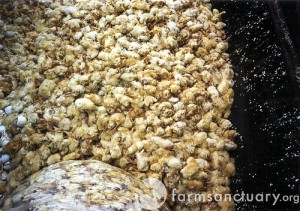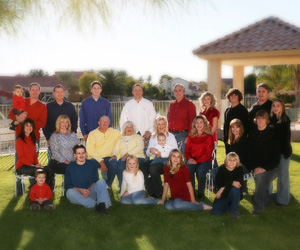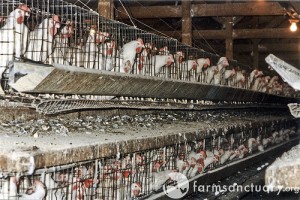
A conversation with Hickman Family Farms
No so long ago I had the unique privileged of meeting Glenn and Clint Hickman. They are brothers that run Hickman Family Farms, a massive egg producing company in Arizona. A group of us had gathered with our fearless leader, Kerri from the Humane Society of the United States, to come up with a plan that encourages restaurants to not use eggs from chickens kept in battery cages. I guess the Hickman brothers were a bit nervous (or just curious, who knows) about what it is we might do to jeopardize their business. While you might think that we were throwing eggs at each other (ha, ha!) we actually had a rather civil debate. And it was fascinating!
I was riveted because Glenn Hickman confirmed all my greatest fears about the egg industry. I have read many things about chickens being kept in tiny cages where they can’t spread their wings, being forced to produce eggs in unnatural quantities, and then killed at a young age when they are no longer able to produce the product valued so highly by their owner. Glenn substantiated all this and more. And he continually claims that he “loves his chickens.” Hmmmm … I use the term love a bit differently.
Here’s what else Glenn Hickman taught me …
- Hickman Family Farms has about 4,000,000 (four million!) caged egg laying hens. They have 400,000 (four hundred thousand) cage free hens.
- Chickens are raised in a hatchery … usually a separate operation from the egg producing facility. The chicks are incubated and hatched at the hatchery. Then the females are sold to egg producers like Hickman Family Farms.
-

These are male chicks that were spared from the macerator only to be thrown into a dumpster alive. This photo is not from Hickman Family Farms.
As in the dairy industry, males are not valued in the egg laying industry. What happens to them is equally as horrible as what happens to baby male cows used for veal. Baby male chickens are fed to a macerator (something like a wood chipper) just hours after they are hatched. They are GROUND UP ALIVE just because they were born male and not female.
- The females get to act like somewhat normal chickens for a few days albeit being kept in tightly packed quarters. Then when they reach 7 days old, the tips of their beaks are cut off without anesthesia. Why? So when they move to the small confined battery cages, they don’t peck each other to death!
- When they do move to their permanent home, the female chickens are provided approximately 67 square inches of space to live in for the two years of their egg producing life. If you hold out a regular 8 1/2 x 11 piece of paper, the allotted space would be smaller than that very piece of paper.
- The chickens live on “floors” that are stacked from ground to ceiling! In some cases the birds have conveyor belts under the cages so that their poo is carried away from their living area. In other cases, the poo literally falls from the top floor to the bottom, landing on tens of thousands of chickens on the way down.
-
The Hickman “barns” in Arizona have about 200,000 chickens in them. Can you imagine? 200,000? To give you some perspective, about 70,000 students attend Arizona State University and it is one of the largest in the country!
- 1,100,000 (1.1 million!) eggs are shipped from Hickman’s Family Farms EVERY 24 HOURS!
- After laying eggs for two years, the Hickman employees come around with a gas cart. I imagine something like an ice cream cart but one that ends in finality for the chicken. They are dumped into the cart 20 at a time and gassed to death.
- And you might think their flesh is used for chicken breast but in fact it is not. Their bodies are ground up as “green waste” and used as compost that Hickman’s sells for more profit. Their breasts are not as “tasty” as the fryer chickens used for food.
Wow, I say to Glenn and Clint. Wow! Is this what you call love? You see I love my dogs and I would never ever put baby boy puppies in a wood chipper. I would never keep my dogs in a cage so small they can’t turn around. If I did put all four in a tiny area for their entire lives and let them shit all over each other, they would indeed kill each other. To prevent that though I would never, ever cut off their teeth without anesthesia. And I would never, ever put them in a “gas truck” when they are two years old just because they couldn’t produce something I could sell to someone else.
You see my dogs don’t produce anything of value to society but they give me uncompromising devotion and constant companionship, they keep my house safe, and they are always good for a hug. That’s it. In return, I let them live a fulfilling happy life as they are meant to. That is what I call “love”.
When I asked Glenn why the chickens can’t be housed in a way that is more comfortable for them, he replied, “It’s economics.”
Glenn filled me in on one other detail that did in fact horrify me. USDA inspection of egg laying facilities is optional. What, I say? Optional? It is optional for farmers to have the USDA inspect their facilities. My friends I ask you … what has your government done for you lately? If they can not ensure food safety, then what the hell are they doing over there in Washington D.C.
If you find any of this information doubtful, take a look for yourself at www.hickmanseggs.com. Clint is featured with Mike Rowe on Dirty Jobs. They actually show the inside of a chicken barn, caged chicken and the way in which they have to discard of thousands of pounds of poo every day.
My friends, an egg is not just an egg. We’ve been taught to eat them because they are a cheap source of protein. But think of the suffering another living being has endured just so someone could eat the byproduct of their reproduction cycle for breakfast? Those eggs aren’t looking so delicious after all.





















Nice post! You’ve got to see this video of the world’s largest egg-laying breed hatchery. It supports what you said about the male chicks. They are so cute too.
http://www.mercyforanimals.org/hatchery/
This morning Hickman Farms was featured on channel 5 news for its contributions to children’s hospital. It was a feel good moment for them.
You are starting to convince me that I really do have more than just health reasons to embrace a vegan lifestyle.
Thanks a lot Josie!
After reading your blog about Hickman Farms, I couldn’t look at an egg the same way. This is such an important article, and it succeeded to turn my stomach upside down, inside out. I thank you for this read.
I too am slowly rolling into the world of vegans, it is a process and I think an important one for people’s health, and for the health of the environment.
Thank you….
Hi, Thanks for the awesome post you have! Im following your blog now
It actually is NOT optional to have the USDA inspect your facility if you have 3,000 or more laying birds. I also have never seen a laying house that was set up where poop fell on birds in lower cages.
Five days ago, a Hickman Farms family member spoke to a community service group I belong to. She showed a video in which they said that the cages had been enlarged, and that the chickens could “turn around”. She used the word “euthanized” for the end of the 112 week “life” instead of “retired”. She kind of took the initiative to light heartedly refer to the business as a “factory farm”, and said “I see no one is running out of the room”. So, she sort of took the addressed all the issues that she expected might be brought up. She also talked about how “free range” was worse than cages for the chickens. I know this blog is 4 years old, so I don’t know if I’ll get a response, but I’d like to know if their cages really are “larger”, and I’d like to know how to find the current 2014 FACTS about whether other things are “better”, including how the chickens are killed, how much bigger the cages are (if at all), and dispel her points if they were misleading. Thanks.
Hi Ed,
Thanks for your comments. I’m still vegan and still promoting animal advocacy but had a baby and have not been able to keep up on my blog. Much of the info is still relevant though so thank you for reading. There has been some legislation passed requiring larger battery cages and larger pens for breeding sows. The reality is that they are only a fraction better in a situation where animals suffer dearly for food production. I don’t know specifically about Hickman Family Farms but I would guess they enlarged their cages in compliance with the new laws. Here is some more information on that: http://www.humanesociety.org/issues/confinement_farm/facts/battery_cages.html
Previously there cages were the size of an 8.5×11 piece of paper and I believe 5? hens would live in them. Maybe now they are 11×11. I don’t know specifically but I’m sure they are not much better. I would assume they continue to macerate the baby male chicks and “euthanize” with a gas cart the spent hens. There has been no legislation to require them to change that. What they are doing is technically legal. Albeit inhumane. If you can, look up Kari Nienstedt, on Facebook. She is the Arizona Director for the Humane Society and keeps up to date on these issues. She could probably tell you more. Thanks for your interest!
Josie